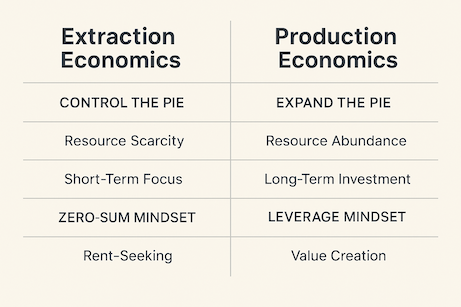The system defaults to extraction because building is harder, slower, riskier — and the system assumes scarcity, so it rewards control over creation.
Extraction is easier to systematize than true creation – especially in a world designed around finite resources and zero-sum logic.
When the system assumes:
-
“There’s only so much land, money, power”
-
“People want infinitely more”
-
“Risk must be minimized”
…then it builds around:
Controlling the pie, not expanding it.
The economics of extraction are faster, easier, and more politically rewarding than the economics of creation.
⚖️ Extraction Wins Because It’s:
-
✅ Immediate
-
✅ Measurable in GDP
-
✅ Politically popular
-
✅ Low risk
-
✅ Doesn’t require vision or stewardship
Meanwhile…
❌ Building is:
-
Slow
-
Complex
-
Long-term
-
Often invisible in metrics
-
Socially or politically inconvenient
Modern economic systems, especially GDP, are designed to measure activity, not outcome.
That means building often shows up as a cost, not a benefit, because:
-
The inputs (time, materials, money, labor) are counted
-
But the long-term value or savings often aren’t
🏠 1. Housing
GDP sees:
-
✔️ The cost of construction (materials, wages, permits)
-
❌ Not the affordability it creates
-
❌ Not the reduced homelessness or improved mental health
-
❌ Not the increased productivity of people living closer to work
The investment is counted. The long-term social dividend is not.
👶 2. Parenting / Families
GDP sees:
-
✔️ The cost of daycare (paid service)
-
❌ Not unpaid parenting (invisible labor)
-
❌ Not the future worker, taxpayer, or innovator
-
❌ Not the social fabric, trust, or cultural continuity
Raising a child is one of the most productive acts — but it appears as a cost or not at all.
📚 3. Education
GDP sees:
-
✔️ Government spending on schools
-
❌ Not actual learning or skill creation
-
❌ Not long-term economic or civic benefit
-
❌ Not cultural transmission or values taught
You can increase GDP by hiring more administrators, not necessarily by teaching better.
If we treat resources as expandable and desire as fulfillable,
then extraction becomes obsolete — and systems can reward builders.
It shows why builders are punished and rentiers are rewarded
